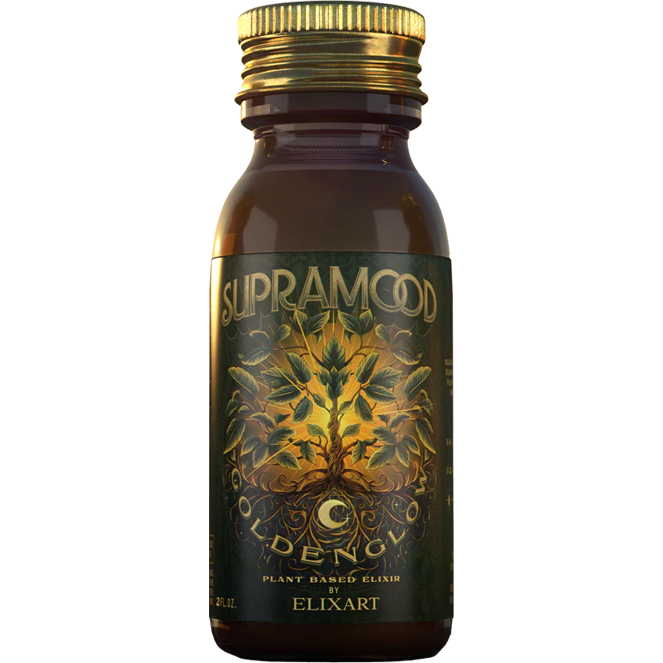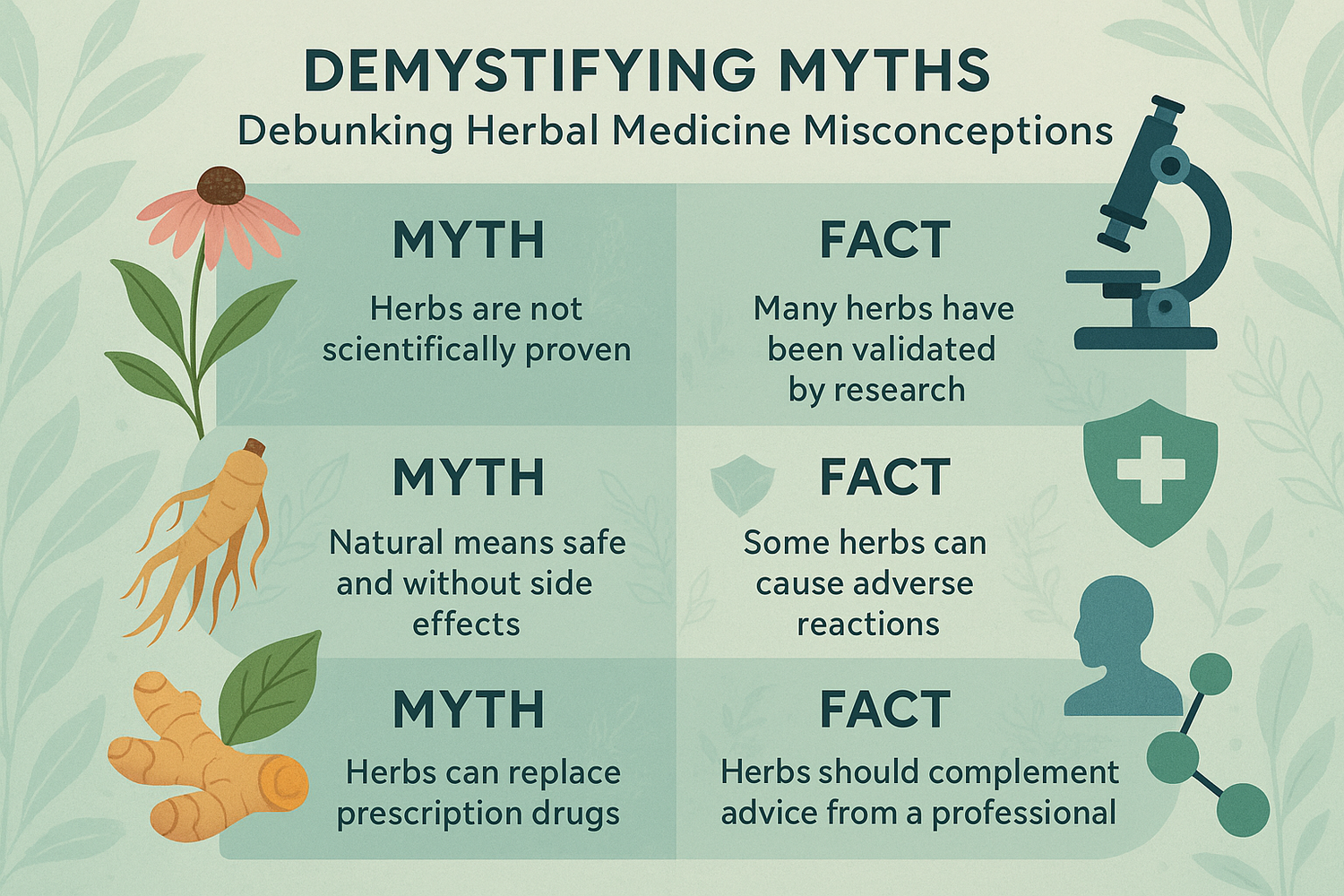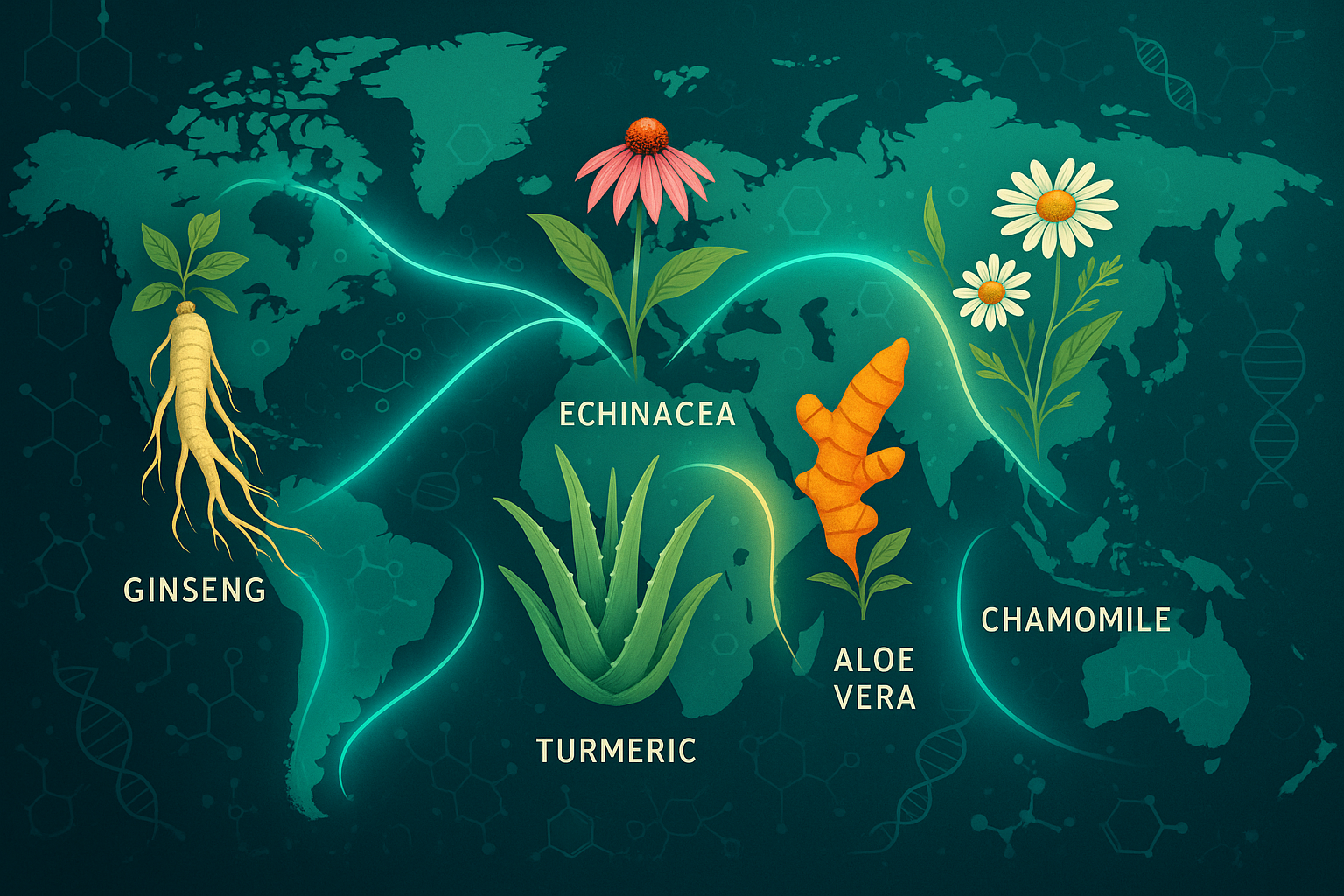Herbal medicine is an ancient practice of using plant-derived substances for therapeutic purposes. It has been widely used around the world for centuries, with people relying on herbal remedies to treat various ailments, from minor colds to chronic conditions. However, despite its long history and widespread use, there are still many myths and misconceptions surrounding herbal medicine.
It is important to address these myths and misconceptions because they can lead to misuse, skepticism, or even the disregard of potentially beneficial treatments. By debunking these misconceptions, our goal is to provide you with accurate information and a clearer understanding of the role of herbal medicine in modern healthcare.
In this article, we will directly address common myths about herbal medicine. We will explore each myth by looking at its historical context, examining the scientific evidence available, and providing practical insights. Additionally, we will use real-life examples and case studies to illustrate both the true potential and limitations of herbal remedies. Our aim is to give you factual insights that will enable you to make informed decisions about incorporating herbal medicine into your health routine.
Myth 1: Herbal Remedies are Ineffective
A common misconception about herbal remedies is that they lack efficacy. Critics often argue that alternative medicine and natural healing methods are nothing more than placebo effects, lacking in scientific validation. This myth persists despite the long history and widespread use of herbal medicine.
Historical Use and Popularity
Herbal medicine has been a cornerstone of healthcare systems across various cultures for centuries. Traditional Chinese Medicine (TCM) and Ayurveda are prime examples, utilizing herbs to treat ailments ranging from digestive issues to chronic pain. These practices have endured the test of time, providing anecdotal evidence of their effectiveness.
Scientific Evidence Supporting Herbal Effectiveness
Modern science supports the effectiveness of certain herbs:
- Echinacea: Known for boosting the immune system, research indicates its potential to reduce the duration and severity of colds.
- St. John's Wort: Frequently used to treat mild to moderate depression, numerous studies have demonstrated its efficacy comparable to standard antidepressants.
- Turmeric: Contains curcumin, which has potent anti-inflammatory properties. Research shows it may help manage conditions like arthritis.
Despite these findings, it's essential to recognize that not all herbal remedies are equally effective. The variability in plant composition due to growing conditions, harvesting methods, and preparation techniques can impact results.
Limitations of Research
While there is scientific support for some herbs, research in this field faces several challenges:
- Funding: Limited financial incentives for large-scale studies on herbs compared to pharmaceutical drugs.
- Standardization: Difficulty in standardizing herbal preparations to ensure consistent dosages and potency.
- Complexity: Herbs often contain multiple active compounds, making it challenging to isolate specific effects.
These limitations highlight the need for further studies to fully understand the potential benefits and drawbacks of herbal remedies.
Case Studies and Personal Experiences
Personal experiences frequently speak volumes about the effectiveness of herbal treatments.
- Case Study - Echinacea: Jane, a frequent traveler, struggled with recurring colds. After incorporating echinacea supplements into her routine, she noticed a significant reduction in illness frequency.
- Personal Experience - Turmeric: Mark suffered from chronic knee pain due to arthritis. After adding turmeric supplements to his diet, he reported decreased pain and increased mobility within months.
These stories underscore the potential benefits of herbal remedies when used responsibly and with proper guidance.
The myth that herbal remedies are ineffective fails to account for historical evidence, scientific support for certain herbs, and numerous positive personal experiences. Despite existing limitations in research, many individuals continue to find relief through natural healing methods.
Myth 2: Herbal Medicine Interacts Negatively with Allopathic Medications
The idea that herbal medicine universally interacts negatively with allopathic medications is a common misconception. While herb-drug interactions are indeed possible, the extent and severity of these interactions can vary widely.
Potential for Interactions
Herb-drug interactions occur when compounds in herbal remedies affect the metabolism or efficacy of prescription drugs. This interaction can either enhance or diminish the effects of the medication, potentially leading to adverse effects or therapeutic failures. For instance:
- St. John's Wort: Known to reduce the effectiveness of oral contraceptives and certain antidepressants.
- Ginkgo Biloba: Can increase the risk of bleeding when taken with blood-thinning medications like warfarin.
Factors Influencing Herb-Drug Interactions
Several factors influence how herbs interact with medications:
- Metabolism: Herbs can alter liver enzymes responsible for drug metabolism. For example, some herbs induce the cytochrome P450 system, affecting how quickly drugs are broken down.
- Dosage: The amount of both the herb and the medication plays a critical role. Higher doses may increase the likelihood of interactions.
- Individual Variation: Genetic differences among individuals can affect how they metabolize both herbs and drugs.
Importance of Informing Healthcare Professionals
To mitigate risks associated with combining treatments, it's crucial to inform your healthcare providers about any herbal remedies you're using alongside prescription medications. Transparency allows for better management and monitoring of potential interactions.
"Patients often think that because something is 'natural,' it can't cause harm, but that's not always true," says Dr. Jane Doe, an integrative medicine specialist.
Healthcare professionals can offer advice on safe usage and may adjust dosages accordingly to minimize risks. A collaborative approach ensures that both conventional and herbal treatments work synergistically rather than antagonistically.
Addressing these misconceptions helps ensure that herbal medicine is integrated safely into broader healthcare practices, offering patients comprehensive treatment options without unnecessary risks.
Myth 3: Herbal Medicine is Unsafe
Concerns about the safety of herbal medicine often stem from issues related to quality, contamination, and misinformation. Understanding these concerns is crucial for anyone considering herbal remedies.
Safety Concerns
Quality and Contamination
Many people worry about the quality of herbal products. Contamination with heavy metals, pesticides, or other harmful substances can occur if herbs are not sourced properly. Ensuring that herbs come from reputable suppliers helps mitigate these risks.
Adverse Effects
Like any form of medication, herbal remedies can have adverse effects. For example, St. John’s Wort can cause photosensitivity, and high doses of licorice root may lead to hypertension. Knowing the potential side effects allows for more informed decision-making.
Sourcing, Preparation, and Dosage
Proper sourcing, preparation, and dosage play a significant role in the safety of herbal medicine:
- Sourcing: Buying herbs from reputable suppliers ensures that they are free from contaminants.
- Preparation: Proper preparation methods help preserve the efficacy and safety of the herbs.
- Dosage: Following recommended dosages minimizes the risk of adverse effects.
Regulatory Measures
Regulations for herbal products vary by country but generally aim to ensure safety and efficacy:
- FDA Regulations: In the United States, the FDA regulates dietary supplements under the Dietary Supplement Health and Education Act (DSHEA). This act requires that supplements be safe and properly labeled.
- Labeling Requirements: Accurate labeling is crucial. Labels must provide information on ingredients, recommended usage, and potential side effects.
Educating Consumers
Educating consumers on responsible usage and potential side effects is essential for minimizing risks associated with herbal medicine:
- Research: Encouraging consumers to conduct their own research before starting any herbal treatment.
- Professional Advice: Consulting healthcare professionals ensures that herbal remedies are used safely alongside other treatments.
- Awareness: Understanding that natural does not always mean safe helps set realistic expectations.
Addressing these aspects provides a clearer picture of how herbal medicine can be safely integrated into healthcare practices. This approach dispels myths surrounding its safety and promotes an informed perspective.
Myth 4: Herbal Treatments Provide Immediate Results
The allure of quick fixes often leads to misconceptions about the duration of herbal treatment. Unlike pharmaceuticals that may offer immediate symptomatic relief, herbal remedies work through a more gradual healing process. The expectation of instant cures with herbal treatments is not realistic.
Exploding the Expectation of Instant Cures
Herbal medicine focuses on long-term wellness rather than short-term symptom suppression. While certain herbs might offer rapid relief for minor issues, most herbal treatments aim to address underlying health imbalances. Expecting immediate results undermines the holistic nature of herbal therapy.
Understanding Holistic Healing
Holistic healing addresses root causes instead of just symptoms. Herbal remedies often integrate into a broader lifestyle and wellness approach. They are designed to:
- Support overall body functions
- Enhance natural healing processes
- Balance physical, emotional, and mental states
This approach requires patience and commitment, as it works progressively to restore health.
Factors Influencing Individual Response
Several factors influence how quickly you might experience benefits from herbal treatments:
- Health Status: Your current health condition plays a significant role. Chronic ailments or severe deficiencies may require longer periods for noticeable improvement.
- Adherence: Consistency in using herbal remedies is crucial. Skipping doses or irregular use can delay the healing process.
- Lifestyle Choices: Diet, stress levels, and other lifestyle factors impact the effectiveness of herbal treatments.
Each individual's response time can vary significantly. Some people might notice changes within weeks, while others may need months for substantial improvements.
Patience Required
Patience is a key element when using herbal medicine. The gradual process ensures that the body adapts and heals without overwhelming its systems. This slow but steady approach aligns with the natural rhythm of your body's healing capabilities.
Examples to Illustrate
- Echinacea: Often used for immune support, it may take several days to boost your defenses against infections.
- St. John’s Wort: Used for mood regulation, it typically requires consistent use over several weeks before noticeable mood improvements occur.
Understanding these aspects helps set realistic expectations and fosters a more effective use of herbal medicine in your wellness journey.
Myth 5: Herbal Remedies are Expensive
A common misconception surrounding herbal medicine is its perceived costliness. Many believe that natural treatments are more expensive than conventional pharmaceutical therapies. However, this isn't always the case.
Comparing Costs: Herbal vs. Pharmaceutical
- Long-term pharmaceutical therapies often come with recurring expenses. Prescription medications can be costly, especially for chronic conditions requiring continuous use.
- Herbal interventions can offer long-term savings. Many herbs used in treatments are inexpensive and widely available. For example, peppermint for digestive issues or chamomile for sleep disorders can be purchased at a fraction of the cost of their pharmaceutical counterparts.
Accessible Options: Growing Your Own Herbs
Growing your own herbs at home provides an incredibly affordable option:
- Home Gardening: A small initial investment in seeds or starter plants can yield a continuous supply of medicinal herbs. Mint, basil, and lavender are easy to grow and maintain.
- Community Gardens: Participate in local community gardens to access a variety of herbs without bearing the full cost yourself.
Community Resources
Taking advantage of community resources further reduces costs:
- Herbal Workshops: Many communities offer free or low-cost workshops on herbal medicine preparation and usage.
- Local Herbalists: Consulting with local herbalists can provide personalized recommendations that might be more affordable and effective than generic over-the-counter solutions.
Affordability of Natural Treatments
The affordability of natural treatments extends beyond just growing herbs at home:
- Bulk Purchases: Buying herbs in bulk from health food stores or online retailers often results in substantial savings.
- DIY Preparations: Preparing your own tinctures, teas, and salves at home using purchased or home-grown herbs can be more cost-effective than buying pre-made products.
Understanding the true cost of herbal remedies requires looking beyond initial expenses to consider long-term savings and accessible options. These aspects demonstrate that herbal medicine can be an affordable alternative to traditional pharmaceutical therapies.
Conclusion
Dispelling misconceptions about herbal medicine is essential for promoting understanding and informed decision-making. Embracing a balanced perspective on herbal medicine allows you to appreciate its potential benefits while acknowledging its limitations. It's important to remember that herbal remedies, like any other form of treatment, should be approached with care and respect.
Encouragement to seek professional advice:
- Consult healthcare professionals: Always inform your healthcare provider about any herbal remedies you are considering or currently using. This ensures safe and effective integration with your existing treatments.
- Educate yourself: Take the time to learn about the herbs you are interested in, including their uses, potential side effects, and interactions with other medications.
- Source responsibly: Ensure that the herbal products you use are sourced from reputable suppliers who adhere to quality standards.
Promoting understanding of herbal medicine involves recognizing its place within a holistic approach to health. By seeking professional guidance and making informed choices, you can safely incorporate herbs into your wellness routine.
FAQs (Frequently Asked Questions)
What is the significance of addressing and clarifying myths about herbal medicine for the public?
The significance lies in providing accurate information to the public, debunking common misconceptions, and promoting a balanced perspective on herbal medicine.
Is it true that herbal remedies are ineffective?
No, there is historical use, popularity, and scientific evidence supporting the effectiveness of certain herbs for various conditions. However, it is important to acknowledge the limitations of research and the need for further studies.
What are the potential interactions between herbal medicine and allopathic medications?
Factors such as metabolism, dosage, and individual response can influence the likelihood and severity of herb-drug interactions. It is crucial to inform healthcare professionals about concurrent use of herbal remedies and medications.
Are herbal medicines safe for consumption?
While there are safety concerns associated with herbal medicine practices, proper sourcing, preparation, dosage, and regulatory measures can minimize risks. It is important to educate consumers on responsible usage and potential side effects.
Do herbal treatments provide immediate results?
No, herbal treatments do not provide immediate results. Understanding the gradual healing process and addressing root causes is essential. Individual response to herbal treatments can also be influenced by factors such as health status and adherence.
Are herbal remedies expensive?
There are accessible options like growing herbs at home or utilizing community resources that can make herbal remedies more affordable compared to long-term pharmaceutical therapies.







Leave a comment
This site is protected by hCaptcha and the hCaptcha Privacy Policy and Terms of Service apply.